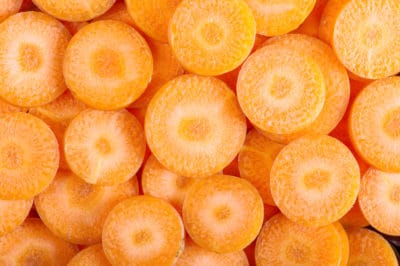What Isn’t the Problem.
When you see that white coating on your carrots, it’s logical to assume it’s mold. But don’t toss those roots just yet! Carrot mold is usually green or black and not easily mistaken for anything else. A dry, thin, white coating on your carrots is not mold and does not render them inedible.
When found on commercially produced baby carrots, it’s often assumed that this white coating is a residue from the bleach solution used in processing the carrots; this residue is said to be dangerous to humans and shouldn’t be consumed. This is a myth. The white coating on baby carrots is due to dehydration, just as with larger carrots.
Your Carrots are Blushing, but They’re not Embarrassed.
That white substance on the surface of your carrots is called blush, and it’s a sign that your carrots are dehydrated. The cells on the inside of the carrot are dying from lack of moisture, and they’re causing that white appearance on the outside. Blushing does not make your carrots unsafe to eat.
Proper Storage Can Prevent Blushing.
You can keep your carrots from drying out and blushing by storing them in a way that preserves their moisture. There are several methods of doing this.
- Store carrots in the refrigerator, in a container filled with water.
- Keep your carrots buried in a large tub of wet sand or sawdust, in a cool, dark place.
- Wipe dirt off recently harvested carrots and tightly wrap them, unwashed, in aluminum foil or plastic wrap, and refrigerate.
- Wash and slice or chop carrots, place in resealable freezer bags, and freeze them.
Blushing carrots are perfectly safe to eat and, in fact, you should eat them as soon as possible. Scrubbing or peeling them will remove the white film which, while not hazardous, may not be appealing to you. Still, cooked or raw, blushed carrots are perfectly fine to eat.
Carrots that have been left to dry out and become soft and flexible aren’t appetizing to look at, but can still be eaten. They’re good in soups and stews, or you can revitalize them by cutting off an end and then placing the cut portion in a jar or glass of ice water; just like putting flowers in a vase!
